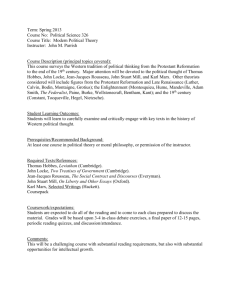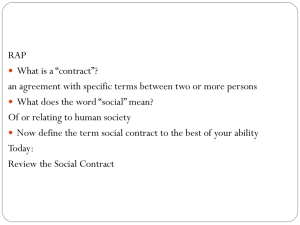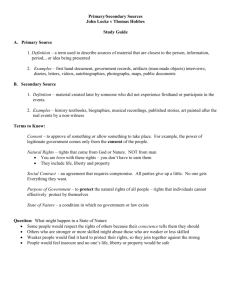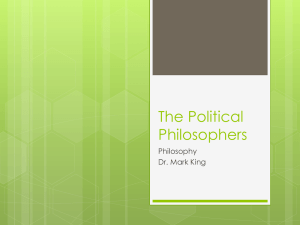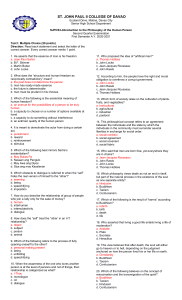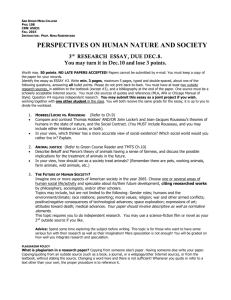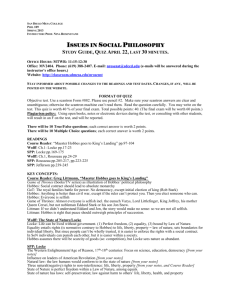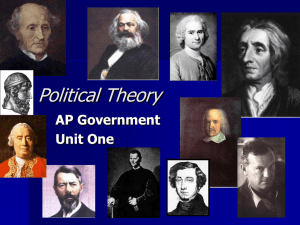Political Philosophy of the US Constitution
advertisement
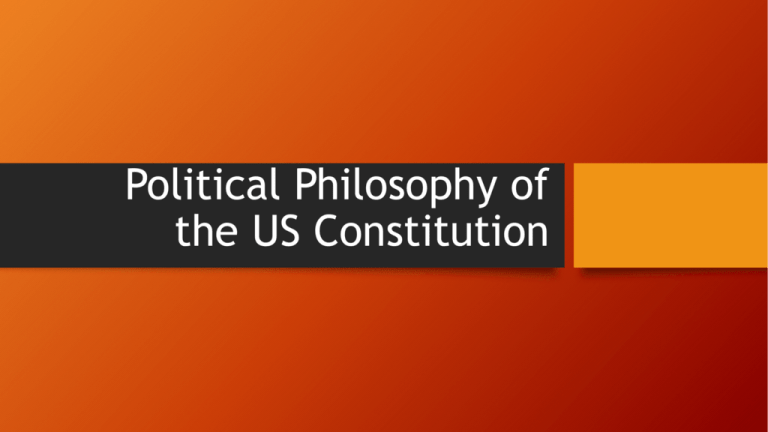
Political Philosophy of the US Constitution Plato Society: • Considered all war to be fought over money • Believed that all humans are essentially Good, but are inherently different--everyone has different strengths which only education fully develops • Social roles, including leadership, must be based on strengths of the individual • Education instills virtue, integrity, and citizenship Plato Government: • Believed in a self-sufficient community, led by a Philosopher-king • Educated to lead • instilled with the virtues of philosophy • Unpaid, so uncorrupt-able • Social roles dependent on talent • Responsibility for survival dependent on community collaboration • The “Masses” can be trusted because they are governed by reason, but shouldn’t lead because they have other strengths Plato Plato’s Republic • Examines justice • People are NOT all equal • Three levels of individuals: • Philosophers (Gold) • Guardians (Silver) • Masses (Bronze) Aristotle Society: • Thought that humans are unique animals because of their ability for reason and complex speech • Humans are not born good or bad, but are a born blank slate, a “tabula rosa” • Society and education instills the ability to “reason” good choices • Society is defined as the unification of people for the common good and mutual benefit Aristotle • • • • • • • • • Government Good: King -rises up from the people to lead- rule by one Aristocracy -group of nobles assassinate tyrant and lead- few Democracy -the people rise up to lead all people- many Bad: Tyrant -dynasty turns corrupt with power after several generations- one Oligarchy -powerful nobles turn corrupt- few Mobocracy -people seek self interest, tyranny of the majority, too many voices heard- many Thomas Hobbes Society: • Considered all humans to be naturally wicked and evil • Competing for survival and resources • Based on greed and self-interest • Can not be trusted • Might makes right • Believed that humans are in a constant state of war due to selfishness and scarcity • Social stability only occurs through a social contract-an agreement to stop killing each other Thomas Hobbes Government: • Because humans can’t be trusted, believed that the best government is an absolute monarchy • Absolute Monarchy-Leviathan • Why government should have absolute authority to wield power to protect life • The Masses agree to give up freedom for peace and security (social contract) Thomas Hobbes • Life is nasty, brutish, and short • State of nature is war • Hobbes believed civil war was the ultimate terror, the definition of fear itself. • Security is most important John Locke Society: • All humans are naturally capable of rational thought • All humans use reason to settle differences and compromise • The “State of Nature” is one of total liberty and freedom • Natural reason results in natural equality between all humans • Humans all depend on property to satisfy their survival needs John Locke Government: • Humans are naturally rational • Humans use reason to govern themselves independently • Rejected Divine Right, focused on the individual • Important to protect “life, Liberty, and Property” • Limit power of the government by a separation of power to check and balance • People enter into a “Social Contract” to allow peaceful government, but always have the right to rebel if life, liberty, and property are threatened John Locke • Second Treatise on Government • People are equal and invested with natural rights in a state of nature in which they live free from outside rule • Natural law governs behavior, and each person has license to execute that law against someone who wrongs them by infringing on their rights John Locke • "If man in the state of nature be so free as has been said, if he be absolute lord of his own person and possessions, equal to the greatest and subject to nobody, why will he part with his freedom, this empire, and subject himself to the dominion and control of any other power? To which it is obvious to answer, that though in the state of nature he hath such a right, yet the enjoyment of it is very uncertain and constantly exposed to the invasion of others; for all being kings as much as he, every man his equal, and the greater part no strict observers of equity and justice, the enjoyment of the property he has in this state is very unsafe, very insecure." John Locke • Government exists for the people's benefit and can be replaced or overthrown if it ceases to function toward that primary end • Consent of the governed – enter into social contract to protect property and ensure liberty Baron De Montesquieu Society: • Considered the French government to be too lavish • Believed that religion corrupted governments, especially Christianity • Considered women to be weak, but valuable participants in political process • Approved of slavery and the natural inequality of the races Baron De Montesquieu Government: • Believed in secular, but ethical, governments • Considered limited monarchy to be the most stable government • Separation of powers essential to stop abuse and corruption=Checks and Balances • Participation based on educated Jean-Jacques Rousseau Society: • All humans are born free, independent and good • People would naturally life happily • Modern society corrupts people • Focus on industry (dehumanized labor) • Focus on money making • Focus on technology • Society makes people unhappy Jean-Jacques Rousseau Government: • Best political unit is small • Best government is a direct democracy, with decisions made by simple majority (of men) • All decisions made locally, according to the needs of the community • Considered elected executives necessary • Believed that government should protect freedom Jean-Jacques Rousseau • “Man is born free, yet he is everywhere in chains” • “Will of all” vs. “General will” • The general will can never err, as it is always aimed at the public good • The will of all is an aggregate of individual self-interest (tyranny is possible) • Purpose of political community is to create a society where everyone chooses the laws that govern them • “Men must be forced to be free” • By nature, men are unequal • Making everyone a citizen in society makes them equal under the law Social Contract Theorists Thomas Hobbes: The Leviathan John Locke: Second Treatise on Government Jean-Jacques Rousseau: Social Contract • Three fundamental ideals which exemplifies the Social Contract: • Natural Rights • Classical Republicanism • Constitutionalism Social Contract • A social contract is an act by which individuals agree to form a government. • The social contract theory states that governments are established by the people who combine to achieve a common outcome. Voltaire • He was a courageous polemicist who fought for civil rights (the right to a fair trial, freedom of speech and freedom of religion) and who denounced the hypocrisies and injustices of the Ancien Régime, which involved an unfair balance of power and taxes between the First Estate (the clergy), the Second Estate (the nobles), and the Third Estate (the commoners and middle class, who were burdened with most of the taxes). Voltaire saw the French bourgeoisie as too small and ineffective, the aristocracy as parasitic and corrupt, the commoners as ignorant and superstitious, and the church as a static force useful only to provide backing for revolutionaries.
